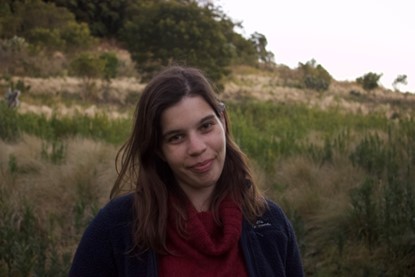Grace Garden
The University of Sydney
Grace Garden is a PhD student at the University of Sydney working with Stephan Tillmann in geometry and topology. Growing up, She often enjoyed mathematics & embraced activities like logic puzzles, riddles, cards, and other mathematical games but she did not consider mathematics seriously as a career pathway until her undergraduate studies.
Grace Garden completed Honours in Pure Mathematics at the University of Sydney in 2015 and, feeling ill-prepared for any further study, She then moved to Brisbane to work as a mathematician at Boeing Research and Technology, Australia. She also relished the opportunity to develop solutions for practical problems and operate within a multidisciplinary team.
After a few years, Grace began to miss some of the challenge and curiosity she had while studying. She started her PhD mid-2019 while continuing to work part-time and eventually moved back to Sydney and transitioned to full-time study in 2021.
Can you give me a quick overview of the type of mathematics you are studying and its potential impacts for the broader community ?
I study geometry and topology, which is an area of pure mathematics and is pretty abstract. I mostly think about surfaces (and similar higher-dimensional objects) and the various symmetries, patterns, and structures we can find and place on them. This gives us insight into the surface or object itself and relates to many other areas of mathematics.
I do not know of any immediate impacts to the broader community, but I always think of this as a long-term investment. Impact on other areas of mathematics will in turn have impact on other areas of science and innovation, enabling new insights and developments in the future.
How did you get into mathematics and into the area of Representation Theory? Was there someone or something that inspired you to this field?
I primarily enjoyed mathematics for two reasons. First, because I found a combination of structure, creativity, and curiosity in my learning that I had not seen elsewhere. Second, because I found a community of people within mathematics that I felt connected to.
I came across geometry and topology, and later representation theory, by opportunity and chance. A few undergraduate courses, including a reading project, introduced me to concepts within geometry and topology and I kept with them for my Honours project. Then, when I was considering possible PhD project, a nice problem came up to use some tools from representation theory to study these geometric and topological objects.
You received a grant to attend AMSI Winter School 2022. How important was this in terms of your ability to attend, fully participate in the program and meet others studying in similar fields?
The grant was used to towards my accommodation fees and enabled me to stay on campus close to where the Winter School was being held. Without the grant I would have needed to find another funding source, otherwise I may have needed to reconsider attending. Being so close to the Winter School location made it easier to engage as much as possible, both in terms of learning new content and mingling with other attendees.
Winter School is designed to give students a deeper understanding of their area of research and expose them to others working in different fields/industries. What was the most valuable part of the program for you? Was it the course content or the people you met? Do you have new ideas for your work/research or see it in a new light?
The most valuable experience for me was connecting with other students. Mathematics is a social activity but completing a PhD can feel isolating and with the pandemic, the last few years has felt even more so. Interacting with other people in similar situations, discussing various studying experiences, and engaging with mathematical problems together is very worthwhile.
AMSI-MSRI Winter School was held as a hybrid event with event hubs in Australia and America. What was the biggest positive from your point of view holding it in this format and/or the biggest challenge?
Given the Winter School often only involves graduate students from Australian institutions, it was great to have the addition of American graduate students. This added another layer to opportunities for socialising and networking.
It was a challenge to have consistent engagement across the two event hubs, as most people were more inclined to interact with people who were at their event hub in person.
What advice would you give to someone who is considering applying for Winter School in 2023? How would you describe the conference to them? Should they apply and why?
I would encourage everyone who is interested in the Winter School topic to apply! The Winter Schools provide a great opportunity to learn in a contained time frame, all with other students and world-leading experts.
Where do you want the mathematical sciences to take you? Where do you see yourself in five, ten years time?
I am not entirely sure yet, I think it depends on how the rest of my PhD goes and what opportunities are available close to the end. Either way, I see myself continuing with mathematics, whether this is a role in industry or government research, or continuing in academia with a postdoctoral position. My main goals are to continue challenging myself and to continue to learn.
Any other feedback/comments you would like to provide on the AMSI Scholarship or AMSI-MSRI Winter School 2022?
Only to say that you for the grant and thank you for all the effort and consideration put into the Winter School!


